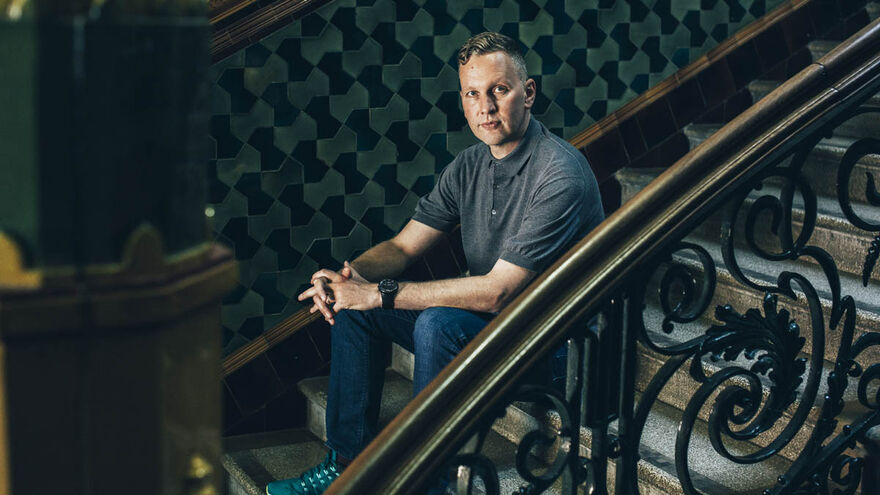
INTERVIEW: Brighton Festival 2018 Guest Director David Shrigley
The visual artist and cartoonist on following in the footsteps of the illustrious roster of Brighton Festival Guest Directors, his love of art, music and football and why he decided to make Brighton his home
When you were first approached to be Guest Director of Brighton Festival, what was it that prompted you to say yes? What most excites you about the role?
When I was approached to be the Guest Director of Brighton Festival, I said yes because I thought it was going to be fun! What I’m most looking forward to is having the opportunity to not only see a lot of stuff and programme stuff but also make some artwork myself and have it presented in the place where I live. I think it’s a really nice way to communicate with people, to meet people and to invite people to come to Brighton.
You’re following in the footsteps of the likes of Anish Kapoor, Laurie Anderson and Brian Eno in accepting the role of Guest Director, how does it feel to be taking up the baton from such company?
It feels pretty flattering given the illustrious roster of people who have fulfilled this role before me, so, yeah, I feel quite humbled to be in such company.
Are there any particular dream artists on your wishlist for Brighton Festival this year?
I think it would be good if David Bowie would come back from the dead and play at the Festival, but that’s probably not going to happen! The great thing about the Festival is that you see things that are really thrilling and wonderful that you’d never heard of before. So, what I’m really looking forward to is the stuff that people haven’t heard of before, that they’re going to be surprised and amazed by.
You’ve recently moved to Brighton, what drew you here and what has been your relationship with the city and the Festival to date?
I lived in Glasgow for 27 years until two years ago when I moved to Brighton because I fancied it, because the weather’s nicer than Glasgow and it’s a town that I’ve always really liked. My sister used to live here in the 1990s so I used to visit quite a lot and I have very happy memories of being here then. When I first started visiting Brighton with a view to moving here, it was around the time of the Festival that Ali Smith was the Guest Director, and it seemed like there was a lot going on, it was super busy and there was a lot of interesting stuff to go and see. The Festival is a great time to be in Brighton.
I hear you’re a fan of Whitehawk football club. Is that something you’ve got into since you moved to Brighton?
I started going to watch Whitehawk play football pretty soon after I moved here. I’m a bit of a football nerd, and I tend to go and watch football wherever I go. I really enjoy watching Whitehawk because it’s a lot of fun, and because the fanbase have really good politics. They are anti-sexist, anti-racist, anti-homophobic, which I think is very important, and is very refreshing, having been a football fan since the 1970s. I also like the fact that you can drink beer and take your dog to Whitehawk.
How important are arts and culture to your own life, and what do you think festivals like Brighton Festival can bring to communities?
The things that I like most in life are art, music, and football, and I think a lot of people like those things as well. I think people need to value the arts perhaps more than they do, because they are very important culturally, but also in terms of people’s wellbeing. Engagement with the arts has a real therapeutic value as well as a cultural value, an entertainment value, and that’s something I’m very passionate about.
You are a member of the Save the Arts campaign, why is it important to you to support the campaign?
I’ve been involved with a few arts organisations that have a political dimension to them. I’ve been involved in community education for a lot of years when I lived in Glasgow, and I’m the patron of a charity for a children’s art gallery there. I’ve been involved in the Save the Arts campaign, which was a lobbying group to campaign not to cut arts funding from the government. More recently I’ve been involved in a policy document about the arts, health and wellbeing, which is to illustrate the value of the arts for people’s health and wellbeing, and how it can be something that needs to be taken seriously by government in those terms, rather than just as entertainment or culture – it’s also a very valuable thing for people’s day to day lives.
Your sculpture - a giant bronze thumbs-up called Really Good – can currently be seen on the Fourth Plinth in Trafalgar Square. How did you feel about being asked to do such a prestigious commission and what role do you think public art plays?
I wrote a kind of slightly ironic blurb about it where I said that basically it was going to make the world a better place through some kind of self-fulfilling prophecy, where you say that everything’s really good and then it becomes really good. And, in a way, that was ironic because it’s slightly ridiculous to suggest that a giant sculpture makes the world a better place. But then at the same time, as an artist, you have to believe that what you do makes the world a better place on some level. So I guess that piece has a strange duality to it, in that it’s both ironic and sincere at the same time.
